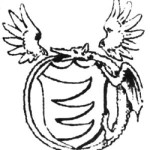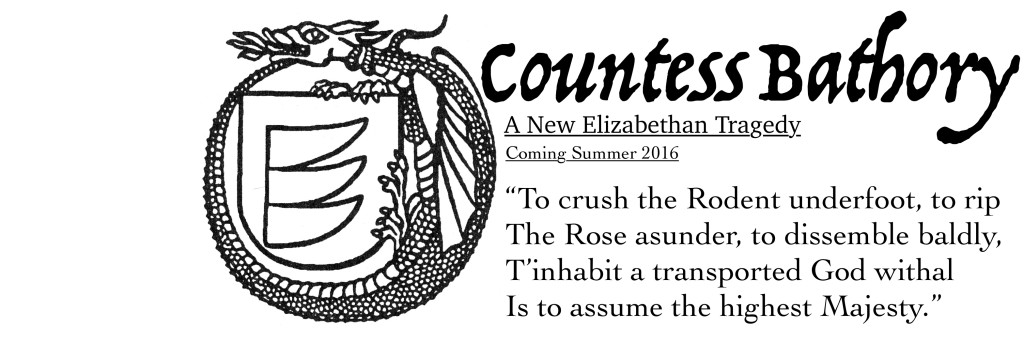CHAPTER 2
Wherein our Hero Falls Ass-Backward into a Job on His First Day in the Big City
Belleraphon was spinning her cellphone around on her desk, barely watching. The black phone performed half circles on the matte grey desk, silently semi-circumnavigating the plain under her half-motivated direction. The sight was framed by a pair of shimmering blue-green locks dangling down either side of her face, each drifting side-to-side each time she moved her arms, like limp pendulums.
Put succinctly, Belleraphon was bored.
Beneath the surface of her desk, unseen by all, was an ancient but beautiful crested shield. It was small, something a youth could wield with a little exercise, but it was solid and still shone brilliantly in the light of the setting sun. Blues, purples, and golds mixed in proud bends and arrows, depicting a stylized warrior’s pyramid in an early evening’s light. Belleraphon was currently setting her feet upon the surface of the shield as it lay on the ground, shifting her weight upon it and trying to exercise her dulled-to-atrophy ankles. She let out a long, defeated sigh in which a careful observer could have made out the word “cankles.” This was in no way an accurate description of her lower extremities, but Belleraphon was convinced she was going to fat and that her thirtieth birthday would see her rounder than the cakes she habitually bought herself. It was a sad state of affairs for the one-time Hero of Chicago, and might have reached the level of tragedy if anyone had ever heard of her.
The company phone rang. A brilliantly white crystal ball, it vibrated in its setting as it lightly chimed and flashed, demanding attention. Belleraphon grumbled something in a tongue more ancient than the Weir People of Winnetka Ave, and just as grimy. She waited until the third chime, long enough to be sure that no one else would pick up, and soon enough to avoid being yelled at by Seraphine, then tapped the orb. The orb’s light went solid pink, and the caller’s busy background noise became audible. Belleraphon forced a smile on her face, hoping it would influence her speaking voice.
“Scoraxis and Smith, this is Raph speaking, how may I help you?”
Someone started speaking in Spanish. Raph spoke American English, Austrio-German, pre-Christian Russian, Serepis, Granchnian, Necrohol, Bat-speak, Gobble-tor, and high school French, and had even taken a six-week course on Abyssmese, but had never bothered to learn Spanish. Considering her current career, it seemed a gross oversight.
“Sir… sir… sir…” the voice on the other end stopped. “This is Scoraxis and Smith,” she explained with an insulting level of enunciation, “You want Vance, Pettigrew, and Koshchei on the twenty-fifth floor. Let me redirect you.”
Her eyes strayed fuzzily from the reception orb to her cell phone: blank, shiny, void, dead, at rest. A symbol of the limitless potential of humanity, reduced to a remarkably inept whirly-gig. Belleraphon could relate. Oh yes, she could relate. Behind her, in the Admin offices, Seraphine was discussing expansion with Gulzag and Tim. They were standing out in the passway between their offices, their murmurs occasionally breaking into forced chuckles. Typical, thought Belleraphon: they get their own offices and never use them. Try as she might, however, she could not generate sufficient spite to raise her out of her apathy. She cast about, despairing for another distraction.
A muted ding sounded. Raph glanced from her desk over to the elevator vestibule, where any of six elevator cars could transport clients and employees anywhere between the 53rd and 70th floors. Scoraxis and Smith leased floors 64 through 70. The 63rd floor was shared by an accounting firm (Barvlok and Barvlok) and an anti-environmental-regulation super PAC (“Green Springs Tomorrow!”); she knew this because many of their employees would mistakenly stumble into 64th floor reception on Monday mornings, bleary-eyed and belligerent. They also had a habit of “accidentally” getting off on the wrong floor on Pizza Fridays, or whenever Seraphine’s menagerie of adorable dogs was brought into the office. Or on Wednesdays, when Seraphine was known to occasionally come to the office in her workout clothes. It was very occasional, but these men (and they were, almost to a man, men) seemed nothing if not optimistic, so far as shirking their few responsibilities was concerned.
This time, however, the elevator vomited no stuffed shirts or poorly-executed comb-overs; no vapid former-jocks with the subtlety inherited from several concussions and the entitlement that only a well-tailored suit and a childhood in the suburbs can engender; no red-eyed grumblers intent on sharing their sexual inadequacies with a rebelliously-haired subordinate; not even a single purebred canine whose daily wash totaled more than Raph’s weekly paycheck. No, today the elevator opened, and a cat got off. It was, perhaps inevitably, black.
Raph had never seen a real cat. In Chicago, a city so close to such a large body of water, cats were hardly unheard-of, but then so were farmers’ markets, and she’d never seen one of those either. And, much like the prospect of facing a deluge of flannel-clad hipsters with organically fly-encrusted vegetables, Raph found herself unsure of how to deal with her current predicament.
Could cats operate elevators? It seemed physically impossible, but with Lake Michigan so close, such terms were more suggestive than definitive. Considering her own place of employ, it was naïve to apply normal physical laws to something so extraordinary as a cat. Unless someone had thrown the creature into the elevator to be rid of it, just happened to press the button for the 64th floor, then ran off (an entirely reasonable premise), it looked as though this portentous visitor had the power to operate machinery outside of its anatomical bailiwick.
Then a man exited the elevator. It had probably only been a few seconds, but with a cat…
The man was short and slight, more Dickensian than a dozen starving-yet-plucky orphans, if one replaced the pluck with slack bemusement. He wore a blousy white shirt, a tattered brown tunic just shy of a burlap potato sack, and green cargo shorts. It was an unusual combo. Although grown and a little saggy, the man had an oddly childish appearance: pale, free of wrinkles, and palpably naïve. As he looked across the lobby and found Belleraphon, apprehension settled on his narrow shoulders like soggy bread on a bad sandwich. The cat, however, strode confidently toward her.
The cat was approaching her desk.
The cat was at her desk.
It leapt up onto the surface and snuggled down just behind her computer monitor.
The cat was on her desk!
Raph seized her cell phone, preparing to use it as a bludgeon. Her sword (a short-sword, naturally) was at home. Scoraxis and Smith did not permit metal weaponry on the premises. They did permit fire staves, death orbs, blood rings, and the ironically named peace makers; but not being a magician, Belleraphon had little use for such things.
The cat continued to sit. Inexplicably, it was licking its forelegs and running them over its own head, repeatedly. Why anyone would want to rub saliva on its head was beyond her, but then in her hero days she had seen things that could turn you white. After you have talked a troll with rabies off a window ledge using old nursery rhymes and a super-soaker full of boiled vodka, or stabbed a quivering mound of eyes in eighty-seven pupils only to have the eighty-eighth erupt in a coruscation of rainbows and country-music instrumentals (which all sounded the same, lending credence to the stereotype), or been jumped at night by what you thought was an orcish raiding party only to discover it was some kind experimental theater troupe (‘Orcs Off Broadway’), you tended to stop questioning the idiosyncrasies of others. So it was with the alleged cat’s spit-bath.
The cat turned its sharp yellow eyes upon her.
Completely involuntarily, Raph shuddered and pushed her chair away. Half rising, and nearly stumbling on her shield while at it, she lifted her cell phone up and prepared to smite the mythic beast into oblivion.
“Mrowl…”
The one-time hero of Chicago dropped beneath her desk like a stringless marionette. An instant later, she was shivering back up to her feet, her shield held before her chest and her eyes barely peaking above its top. Her cellphone had clattered… somewhere.
“Mrowl…”
It was an odd sort of noise for something as inscrutably deadly as a cat to make. Yet, it did seem to fit such a small creature. She continued to stare. It continued to stare. No one moved.
After an inordinate pause, the cat closed its eyes and rested its head upon the desk. Belleraphon, having only just realized she had been holding her breath the whole time, exhaled and began panting obscenely.
When her senses at last returned, she looked up. The stooping man-boy was standing directly in front of the desk.
They stared at each other. The cat slept.
Raph cleared her throat, both deliberately and softly. There was no attempt to regain her dignity; after all it was irreparably lost, and who was this fifteenth-century-serf-cum-hobgoblin to judge her anyway? No, she was merely trying to signal an end to combat, an opening of diplomatic relations.
Well aware of the redundancy of the question, she asked, “That is a cat, isn’t it?”
The man-boy’s face was a complete blank. He did not give the impression of one skilled in dissimulation, so Raph concluded that he either did not speak English or was a simpleton. As one might conclude from her most recent phone-call, she held an uncharitably similar opinion of both such people.
After making sure he was looking directly at her, she widened her eyes before lowering them to the deceptively inert feline. “Cat?” she asked, broadly.
“Diane.”
She quirked her eyebrows palpably. “What diane? Like, a Nymph?” She had never seen a nymph either, though they were as common as muggers around the Lake. Actually, since a gang of nymphs calling themselves the Dianaids had taken up residence just off Balbo and Lakeshore, the area mugger population had plummeted.
The man-boy stared, vacant. “The cat. The cat is Diane. That’s her name. The cat. Diane.”
Feeling that absolute specificity was the better part of valor, she lifted her left hand over her shield and delicately pointed toward the animal in question, her eyebrows rising to an insultingly patronizing height. “That. That is a cat.”
His face might well have been carved from especially prosaic stone. Probably something igneous. He nodded.
Raph’s terror was stretching her face into a rictal sneer. Her eyes widened to such a degree that their desire to vacate the premises was immediately evident. She whispered acidly, “Get. It. Out. Of. Here.”
Finally, his face altered ever-so-slightly. There was the tiniest sensation of sinking, of withdrawing back into himself, and Raph instantly felt guilty; not guilty enough to endure a cat, but still… guilty.
The bloused one scooped up the cat, Diane, in his arms. No sooner had he done so, than it leapt out of his grip, straight toward Raph’s face.
With a scream that might make a Banshee consider investing more strongly in her day job, the one-time Hero of Chicago fell onto her back in a reversed child’s pose, attempting to collapse her entire body behind her shield. A small thunk and a tiny pressure told her the cat was on her shield. Raph was now breathing in tiny, rasping heaves.
“Belleraphon?” called a sultry, melodic, enchanting, firm, divine, and thoroughly unamused voice. She glanced up, and there stood Seraphine.
The tallest person in the room by a comfortable foot, Seraphine was dressed relatively casually for a Monday: translucent sea-foam skirts hugged her famous hips and swept down to her remarkably defined ankles. Her top, an uncharacteristically shapeless sweater of light blue, together with a few veilish scarves, obscured her enviably svelte and unjustly endowed figure more than was her usual wont. Nevertheless, a rapid glance at the little man-boy showed that Seraphine’s attempt at false modesty was as alluring as any other ensemble she adopted.
Her eyes, framed by entirely ornamental glasses, flashed a brief blood-red, though her statuesque features regarded Raph with their usual collection of patronizing concern and magnanimous condescension. After a solid three seconds of silence, to make sure everyone knew just who was standing and just who was lying on the floor, she asked in a flawlessly innocent tone, “Is everything all right?”
Now regarding her dignity as a lost legend, Belleraphon made no attempt to regain her feet. Instead, she widened her eyes to cartoonish extremes and looked toward the center of her shield. Peeping over its crest, she could now see the shadowy form of Diane, curled up and evidently asleep.
“Yyyeeeeeesss…?” the Head of HR drawled, as though a cat were no less common than her own Pomeranian, Tiggles. When no further explanation was forthcoming, her now opalescent eyes sauntered over to the stranger. “May I help you, sir?”
Both ‘help’ and ‘sir’ had been sautéed in just enough emphasis to clarify who was the real servant in this relationship, and who was actually deserving of an honorific. If the hobbit-thing recognized any insult, however, he was playing his cards as close to his virtually-concave chest as ever. “My cat,” he murmured. “I was just getting my cat.”
There was a thrum in the air on “cat,” and Belleraphon looked back to her supervisor. To the casual observer (of which she had many), Seraphine had not altered her calm superiority in any fashion, but there was a just-perceptible tightness in her full, red lips that could well betray any depth of emotions. Her eyes lost their luster, going from opal to deep shadow, but her inquiry was as warmly smug and invitingly snide as ever. “Your cat?”
The halfling-guy leaned around the front of the desk a bit and pointed languidly at Diane. “Diane. My cat.” Was he high? Did people still smoke pot? Raph spared a glance, but saw none of the telltale purple bruising at his knuckles, nor any yellowing around his large, childish eyes.
“She’s adorable,” Seraphine, almost purring, assured the stranger. “I’m Seraphine, by the way.” The silence that followed was almost predictable by now. “And you are?”
His masklike face was starting to show stirrings of life in her Venus-like presence. Even for such a bizarrely laconic creature, it was not a surprising reaction. “Noel.” The disappointingly dull name burbled like mud out of his thin lips.
Seraphine smiled, and as always, the room lit up. “Lovely to meet you, Noel. This is your cat?” she mused, relaxing back on her right heel. Raph stretched her eyesight to discover that the heels in question were of various blended shades matching the skirts and silks that adorned the rest of Seraphine. Everything on her body was no doubt custom ordered, and the sale of the outfit could feed a family for a year. Most likely.
There was a softer, slighter “Mrowl,” and Belleraphon immediately reprioritized her entire life around the ten pounds resting upon her shield.
“Forgive me,” Seraphine continued, “but Diane seems to be terrorizing my receptionist.” A honeyed suggestion of kind-spirited laughter draped itself languorously upon her words. Whatever else she was, she was collected under pressure. “Could you retrieve her please?” she requested, her eyes now a sparkling violet crowning her unstoppable smile.
Silently, Noel lurched around the desk, showing not even the tiniest molecule of hesitation as he stooped down and picked the cat back up in his arms. Diane squirmed, but Noel held her firmly this time. He stood, the cat secured in his arms like a baby, staring vacantly at Seraphine.
“You seem to really know your way around that cat.”
The faintest hints of confusion settled upon the still vacuous face. “Well… She’s… she’s not mine, but… I took care of her all my life. I guess she’s mine now.”
There was a noticeable crack of surprise in Seraphine’s façade, which she quickly disguised as admiration. “You own a cat?” More silence. “What floor do you work on, Noel?”
If she were not so terrified, Raph might have started counting the seconds between each question and answer. “I don’t… I… she just wandered in… and into the elevator. I don’t know why she got off here. I don’t… I don’t work here.”
A cautious courage finally began to manifest in Seraphine: she took a step toward the little man, casually tossing a hip out in the coquettish manner of a woman far more accustomed to nonsense than she actually was. “And where do you work, Noel?”
“It burnt down,” he answered with, for him, remarkable rapidity. “I guess I don’t work anywhere.” The thing called Noel was growing dangerously close to becoming slightly interesting.
Her face lit up again, and the room was bright as day. “Well what luck,” she immediately countered, her eyes blue as the summer sky. “We’ve just had an admin position open up. We could really use someone who has a way with animals. Have you got a resume handy, by chance?”
By the look on his face, Raph was reasonably certain Noel had no idea what a resume was. Maybe he was Amish. Did Amish still exist? She had finally started to relax, but felt very much like a fly on the wall (as it were), and was worried that standing or returning to her seat would only draw embarrassing attention to herself.
Seraphine took a step back toward the offices. “Well come on back anyway. Let’s have a talk while you’re here, and we can worry about technicalities later; what do you say?”
Noel, by now standing next to Raph’s chair, shuffled uncomfortably. It was only then she noticed he was barefoot, his soles black as pitch.
Without a word, Noel followed Seraphine back into the offices. A few seconds later, Gulzag let out a hilarious squeal, and Raph finally stood up. She crouched under her desk, replaced her shield, found her cellphone wedged under some wires, and returned to her seat.
As if on cue, the orb rang.
“Scoraxis and Smith, this is Raph speaking, how my I help you?”
A gravelly, unearthly voice demanded by all the spheres and unholy crevices of the benighted outer realms to speak to Dave in accounts receivable. His demand was spoken in Necrohol, a fairly obscure language that Belleraphon just happened to speak.
“Of course, Sir,” she answered in kind, her vowels a bit shaky but otherwise well in practice, “I’ll transfer you at once. May death fall swiftly upon your enemies.”
The voice responded, suddenly much more polite, thanking her and wishing her a grand and impressive demise. She transferred the call, very much wishing herself the same thing.
Seraphine’s rhapsodic laughter rang out, to all ears entirely genuine, just before she shut the door to her office. Raph spent a lot of time hating Seraphine, but she had to admire anyone who would close themselves up in a small room with a cat.
A soft ding sounded, and the exact same elevator door opened. Sir Ponderus, the old and overweight janitor, slumped out with his roller-bucket, offering a tired smile and a wave. Raph returned the smile, but was not quite up to waving yet.
Just before the elevator closed, a tall, attractive man with perfectly quaffed blond hair and bloodshot red eyes stumbled out. He took a look around, shrugged, and took the next elevator down.
Raph tried to roll her eyes, but could not find the motivation. She watched Sir Ponderus rolling toward the Operations cubicles, where the men’s bathroom could be found. He vanished around a corner.
Belleraphon looked down at her cellphone. Cellphones used to control the world, now they were essentially ballast. Still, it was her ballast. She spun her ballast around on the desk, barely watching. The black phone described half circles on the matte grey desk, silently semi-circumnavigating the plain under her half-motivated direction.
Belleraphon glanced at her clock. It was 8:57.

















